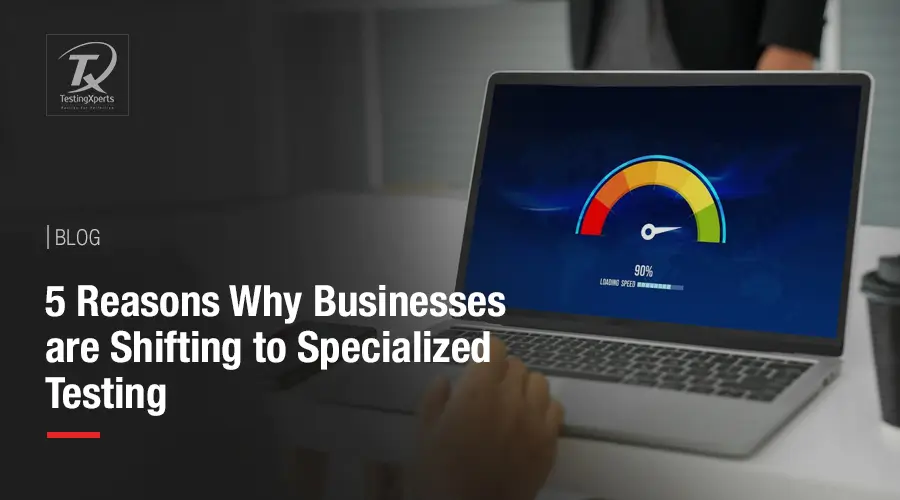
- Why is Specialized Testing at the Center of Global Businesses?
- 5 Reasons Businesses Are Showing Interest in Specialized Testing
- 4 Key Drivers of Specialized Testing
- Why Partner with Tx for Specialized Testing Services?
- Summary
With the rise in digital transformation and AI technologies, the demand for specialized testing solutions is also increasing. Traditional QA practices can no longer cope with today’s business requirements to deliver products that meet modern users’ expectations. That’s why specialized testing focusing on performance, UX, and cognitive domains is now crucial to ensuring security, reliability, and resilience in the digital environment.
Businesses need to maximize the use of next-generation tech, such as AI, crowd testing, genAI, etc., to meet the demands of modern users and stay competitive. The NelsonHall 2024 Quality Engineering Market Assessment shows that shifting to specialized testing is not a short-term trend. It showcases the rapid changes in business priorities while highlighting that the specialized testing market is projected to grow annually by 10%.
The Shift in Testing Landscape
According to the NelsonHall Report, performance testing is in the lead, growing annually at an 8% CAGR. One reason for this growth is the rising demand for cloud-hosted applications that require rigorous reliability, speed, and scalability testing. Cognitive test automation, powered by GenAI, is another high-growth area that can automate complex testing scenarios, detect anomalies with precision, and analyze data quickly, making it a critical aspect of modern QA. These solutions are significant as businesses seek new opportunities to remain competitive in the evolving digital ecosystem.
Why is Specialized Testing at the Center of Global Businesses?
Specialized testing involves leveraging innovative technologies to meet users’ expectations while addressing a rapidly evolving business ecosystem. It allows businesses to tackle traditional software testing limitations while ensuring the final product meets the following criteria:
- Responsive design
- Optimized mobile accessibility
- Seamless global usage
- Better performance
- Uninterrupted interoperability
- Enhanced Accessibility
Specialized testing helps fill the gap left by outdated QA practices while allowing organizations to leverage emerging technologies to deliver high-quality products. It would help them meet the rising user demands across RPA, IoT, AI, Cloud, and Blockchain domains.
5 Reasons Businesses Are Showing Interest in Specialized Testing
Here’s why specialized testing is gaining interest from global business leaders:
Early Bug Detection:
Software product quality is a major competitive differentiator in today’s digital ecosystem. Specialized testing enables early and effective bug detection by integrating QA strategies that focus on testing often and early. It brings the testing process into the core of the engineering process and assists businesses in delivering enhanced user experience by implementing continuous testing methodologies.
Quality Across Development Cycle:
Multiple stakeholders work to resolve software issues, and specialized testing ensures quality across the SDLC. Every member is responsible for the end product’s security, availability, and reliability and provides top performance and functionality in every development phase.
Test Process Automation:
Specialized testing integrates automation to fasten the QA process without compromising quality. Teams can use automation frameworks built for web, API, and desktop applications to speed up the testing. This also enables E2E integration testing across the product development environment.
Streamlined Communication:
Businesses can streamline frequent communication across SDLC between teams, allowing faster issue identification and resolution. Everyone will know the project’s current status and the activities performed by the members, increasing the chance that the final product will meet quality standards.
Better Risk Management:
Specialized testing will allow businesses to leverage operations assistant frameworks, which can assist with monitoring, self-healing, and alerting capabilities. By constantly monitoring servers, database performance, and application URLs, businesses can proactively detect bugs/issues while sending alerts to respective teams.
4 Key Drivers of Specialized Testing
Regulatory Standards:
Global regulatory standards are becoming stricter, especially regarding accessibility. In Europe and the US, the demand for accessibility testing is higher due to the mandates for inclusive software designs, especially in the retail and public services industries. Although regulatory compliance is a primary driver, ensuring high accessibility will result in better user satisfaction.
UX Testing:
User experience is one of the top priorities for businesses. This is why UX testing is crucial to ensure the usability, compatibility, and accessibility of the product. Also, the demand for compatibility testing across OS, devices, and browsers is strong because of the increased adoption of digital technologies.
SaaS and Cloud:
Cloud-based platforms like SAP and Salesforce have drastically changed testing requirements. Businesses are migrating to SaaS and cloud to shift from app functionality to ensuring infrastructure reliability. Leveraging automated testing solutions to validate cloud performance is becoming a standard among businesses.
Security:
Security testing is paramount and comes before performance/functional testing. As cyber threats have become a significant concern over the last few years, businesses are investing heavily in product security. Security testing is driven by the need to ensure robust defenses and protection of sensitive data.
Why Partner with Tx for Specialized Testing Services?
Modern software development practices require a proactive and innovative approach to digital QA. It’s not only about validating and delivering multi-functional web, desktop, and mobile apps. It’s about including every next-gen tech like AI/ML, security, IoT, BI, Big Data, and various ecosystems in which your software/application participates. Tx has vast experience in leveraging an integrated approach to development and testing to accelerate software release cycles.
Our experience in specialized testing includes performance testing, UX testing, security testing, SAP testing, test automation, and more. We assist our clients in streamlining testing solutions by leveraging the specialized accelerators developed by our TCoE (Testing Center of Excellence).
Conclusion
Specialized testing is transforming the quality assurance ecosystem by addressing the limitations of traditional QA methods. With digital transformation driving demand, businesses are adopting specialized testing to meet evolving user expectations and ensure performance, security, and accessibility. Its key benefits include early bug detection, quality across the SDLC, test automation, better risk management, and more. Partnering with specialized testing providers like Tx would ensure your business with seamless integration of advanced technologies, faster releases, and robust QA frameworks. It will also help you stay competitive in a rapidly changing digital ecosystem. To know more about our capabilities in specialized testing and how Tx QA experts can help, contact us now.
Discover more
Get in Touch
Stay Updated
Subscribe for more info




